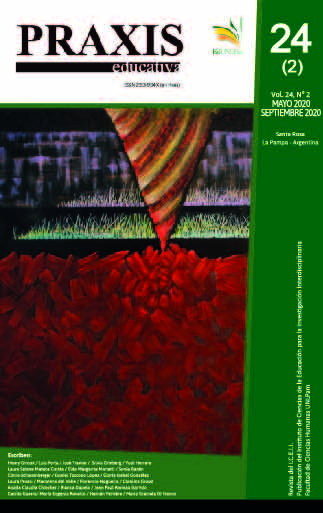Alejandra Pupio, Rodrigo Alonzo Alcalde y Laura de la Fuente (eds.) ¿Qué nos hace humanos? Un manual para pensar (nos) en las aulas. Bahía Blanca: Editorial de la Universidad Nacional del Sur. Año 2019. 190 páginas. Reseña de Hernán Perrière
DOI:
https://doi.org/10.19137/DOI:%20https://dx.doi.org/10.19137/praxiseducativa-2020-240213Keywords:
Escuelas secundarias, evolución humana, educación, interculturalidad, manualAbstract
¿Qué nos hace humanos? es un manual para pensarnos en las aulas de las escuelas argentinas que parte de un proyecto editorial interdisciplinario y que articula investigaciones realizadas por distintos equipos en la Argentina y en España. Es un libro que parte de preguntas que estudiantes secundarios se realizaron sobre la evolución humana y que son respondidas por especialistas científicos, artistas y desde la filosofía. Este manual es un valioso aporte para la enseñanza de la prehistoria y de la vida humana. Un libro de escritura colectiva y de divulgación científica, que propone pensarnos desde la diversidad, la pluralidad y la alteridad. En esta reseña, destaco los aportes de este manual para el desarrollo de prácticas interculturales en los espacios escolares.
Downloads
References
Batallán G. (2011). Introducción. La visibilidad de los niños y jóvenes en el debate sobre la participación política. Puntos críticos desde una perspectiva histórico-etnográfica de investigación. En Batallán G. y M. R. Neufeld. Discusiones sobre infancia y adolescencia: niños y jóvenes dentro y fuera de la escuela. Buenos Aires: Biblos.
Díaz R. y A. Rodríguez de Anca. (2014). Activismo intercultural: una mirada descolonizadora, crítica e interseccional. En Villa A. I. y M. E. Martínez. Relaciones escolares y diferencias culturales: la educación en perspectiva intercultural. Ciudad Autónoma de Buenos Aires: Centro de Publicaciones Educativas y Material Didáctico.
Grimson A., S. Merenson y G. Noel. (2011). Descentramientos teóricos. Introducción. En Grimson A. (comp.) Antropología ahora. Buenos Aires: Siglo Veintiuno Editores.
Krotz E. (1994). Alteridad y pregunta antropológica. Alteridades 4 (8): 5-11.
Recuperado de http://unrn.edu.ar/blogs/antropologia/files/2014/02/Krotz-alteridady-pregunta-antropologica.pdf
Neufeld M. R. (2012). ¿Persistencia o retorno del racismo? Consideraciones desde la antropología de la educación. En S. Llomovatte y C. Kaplan. Desigualdad educativa: la naturaleza como pretexto. Buenos Aires: Centro de Publicaciones Educativas y Material Didáctico. Recuperado de https://www.suteba.org.ar/download/bibliografa-para-concurso-43454.pdf
Rockwell E. (2011). Los niños en los intersticios de la cotidianeidad escolar ¿Resistencia, apropiación o subversión? En Batallán G. y M. R. Neufeld. Discusiones sobre infancia y adolescencia: niños y jóvenes dentro y fuera de la escuela. Buenos Aires: Biblos.
Downloads
Published
Issue
Section
License
Copyright Notice
Editorial Committee Educational Praxis Magazine:
I hereby declare that I am the author of the article titled (article name), that it is original and my own and that it was not previously published in any other format or medium. I declare to know that the magazine will not charge me any type of fee under any circumstances, nor will I receive any type of monetary compensation If it were accepted for publication in Educational Praxis, I authorize the aforementioned magazine to publish it digitally and to advertise it on its social networks.
If the work is published, I adhere to the Creative Commons license called "Attribution - Non-Commercial Share Alike CC BY-NC-SA", through which it is allowed to copy, reproduce, distribute, publicly communicate the work and generate derivative works, as long as when the original author is cited and acknowledged. This license has been used since September 2018. In 2016 CC BY NC ND 4.0 was adhered to; and in the years 2017 and 2018 (January-August) CC BY NC 4.0.
This CC BY-NC-SA Share Alike license does not, however, permit commercial use of the work. As an author, the journal may establish additional agreements for the non-exclusive distribution of the version of the work published in the journal, it allows me to self-archive the published articles, in their post-print version, in institutional, thematic repositories, personal web pages or any other relevant use. with the recognition of having been first published in this journal.
Educational Praxis adheres to DORA (Declaration on Research Assessment) signed in San Francisco, California, on December 16, 2012, and to the Declaration of Mexico (Joint Declaration LATINDEX - REDALYC - CLACSO - IBICT).















_(1)2.png)


3.png)











_(2).png)






2.jpg)









